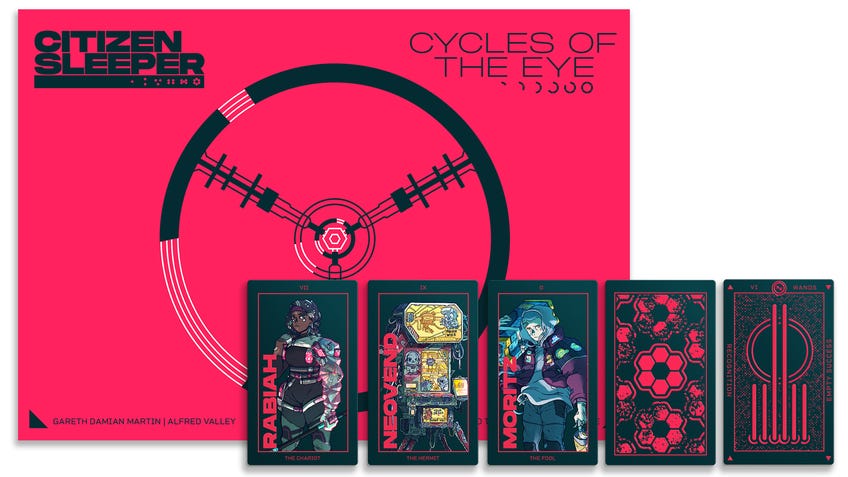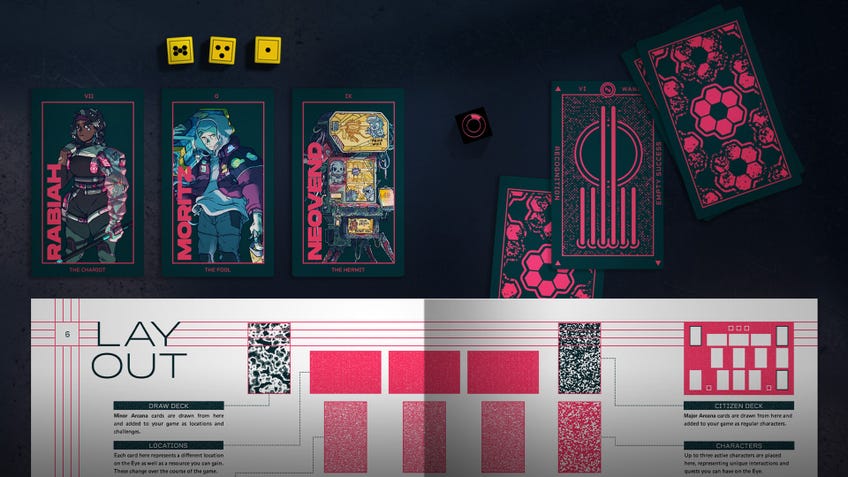Indie video game gem Citizen Sleeper is being turned into a single-player tabletop RPG
From creator Gareth Damian Martin and solo RPG designer Alfred Valley, Cycles of the Eye uses tarot cards and dice.
Acclaimed indie video game Citizen Sleeper is headed to the tabletop in a new solo RPG co-designed by its original creator.
Citizen Sleeper’s tabletop RPG Cycles of the Eye follows the setup of Gareth Damian Martin’s video game, as the lone player’s Sleeper awakes on a mysterious, lawless space station known as Erlin’s Eye. As in the video game, the tabletop RPG follows the player as they meet the various inhabitants of the station and attempt to flee the capitalist corporation that embedded their former worker’s human mind in an artificial body.
While Citizen Sleeper already drew heavily from pen-and-paper roleplaying games in its use of dice rolls assigned to perform actions - Martin cites Blades in the Dark as a key influence - its own tabletop RPG will evolve its gameplay even further. Joining Martin as co-designer for the tabletop translation is Alfred Valley, the indie RPG designer behind solo games Lay On Hands and Thousand Empty Light.
Like the video game, the tabletop RPG will centre around the limited ability of its single player during each ‘cycle’. Certain actions are timed by clocks, which gradually tick down across cycles and eventually become unavailable - or have other effects - if not activated.
Each cycle, the player must assign five dice, representing their available capacity during a single round. Each die result dictates the possibility of success in a certain action. If the player rolls a 1 during the start of a new round, a die is removed from the pool as a reflection of their character’s decaying body. Resource cards can be used to recover any lost dice.

New to the tabletop RPG’s reimplementation of the digital game’s dice-driven gameplay is the added use of tarot cards. The cards are drawn from a 78-card deck to generate available activities, locations, characters encountered, resources and other elements of the world, inspired by the meaning of each tarot card.
When a Major Arcana card is drawn, it triggers a set of narrative challenges tied to one of the Eye’s residents. Successfully completing a challenge, tracked by cycle dice, adds the character to one of three slots in the player’s tableau, influencing the end result of their playthrough’s story. Enemies such as bounty hunters and agents of the corporation on your tail can similarly fill a slot and affect the outcome of the player’s story if undefeated.
When all three slots are filled, the player narrates their character’s fate in the form of a journalling RPG - taking into account the characters in their tableau and the outcome of their challenges as they discover whether their character survived, escaped or settled into a new life on the Eye.
Cycles of the Eye will be released as a standalone rulebook, as well as part of Deluxe and Anniversary editions of an upcoming Citizen Sleeper art book offered via a crowdfunding campaign running from July 2nd, marking the one-year anniversary of the video game. While the game can be played with standard dice and tarot cards, a custom set of dice - modelled on those seen in the video game - and tarot card deck will be released alongside the rulebook.


